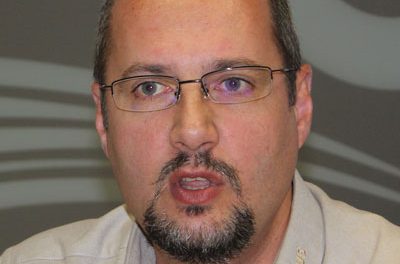
Health and hygiene in the City

Seru Kahiha ,Environmental Health Practitioner at the City of Windhoek and Helena Hakwenye, 4th year Bsc. Environmental Health student at the Polytechnic, showed traders at Soweto Market how to keep their food healthy and hygienic. (Photograph by Lorato Khobetsi)
The main aims of the event was to promote health and hygiene at the city’s informal markets to increase awareness, improve hygiene conditions, improve maintenance of market infrastructure, promote a clean market and inspect meat while promoting a healthy environment.
Speaking on behalf of her Worship, Elaine Trepper, the mayor of the City of Windhoek, the deputy mayor, Gersone Kamatuka said that the event is the City’s contribution to national efforts of promoting health, safeguarding public health and promoting a conducive trading environment for small businesses.
Kamatuka said markets are an important part of the City’s economy as they provide micro-entrepreneurs with access to lockable stalls or open trading areas depending on their needs and capacity with access to other facilities such as storage, ablution, running water and electricity.
“The City of Windhoek has created markets in an effort to promote economic empowerment. Equally, the residents within the City make use of the markets as a source of affordable products and services. Consequently, access to appropriate business infrastructure is critical to ensure quality of products manufactured and service delivery by small and medium enterprises within the City of Windhoek,” he said.
As the markets were created to promote economic development, he said it is important that market infrastructure and the surrounding environment are kept clean, and that a high standard of hygiene is maintained to prevent diseases, and in turn, to promote health.
“The maintenance of a high standard of hygiene at our markets is currently a challenge as reflected in reports of routine hygiene monitoring activities performed by the City at the markets. Unhygienic environmental conditions observed regularly at markets, and inadequate market infrastructure which is not regularly maintained, may pose a serious risk to the health of our residents visiting these markets, unless current efforts are intensified to achieve a high level of hygiene,” he said.
“The Health and Hygiene Promotion Month is therefore a robust response to the challenges of inadequate market infrastructure, and poor hygiene conditions at markets, with the overall aim of improving the health and wellbeing of Windhoek residents.”
It is of paramount importance to ensure that markets conform to basic health and hygiene requirements in order to ultimately prevent diseases, avert death and protect public health. Traders are therefore encouraged to utilise the facilities that are provided, because such facilities enable them to establish and develop their businesses in an environment that is conducive, secure, clean, and hygienic for themselves and their customers.
“My commitment equally stems from the City’s responsibility of ensuing that the provided facilities and infrastructure are kept clean, hygienic and maintained in good repair, to ensure the safety of the food and other services offered to the public at the markets,” read the mayor’s message.
To date, the City has constructed a total of 16 markets and has identified suitable and strategically located sites for craft traders in Windhoek for example Post Street Mall, Semi Mall and Truck Port.












































